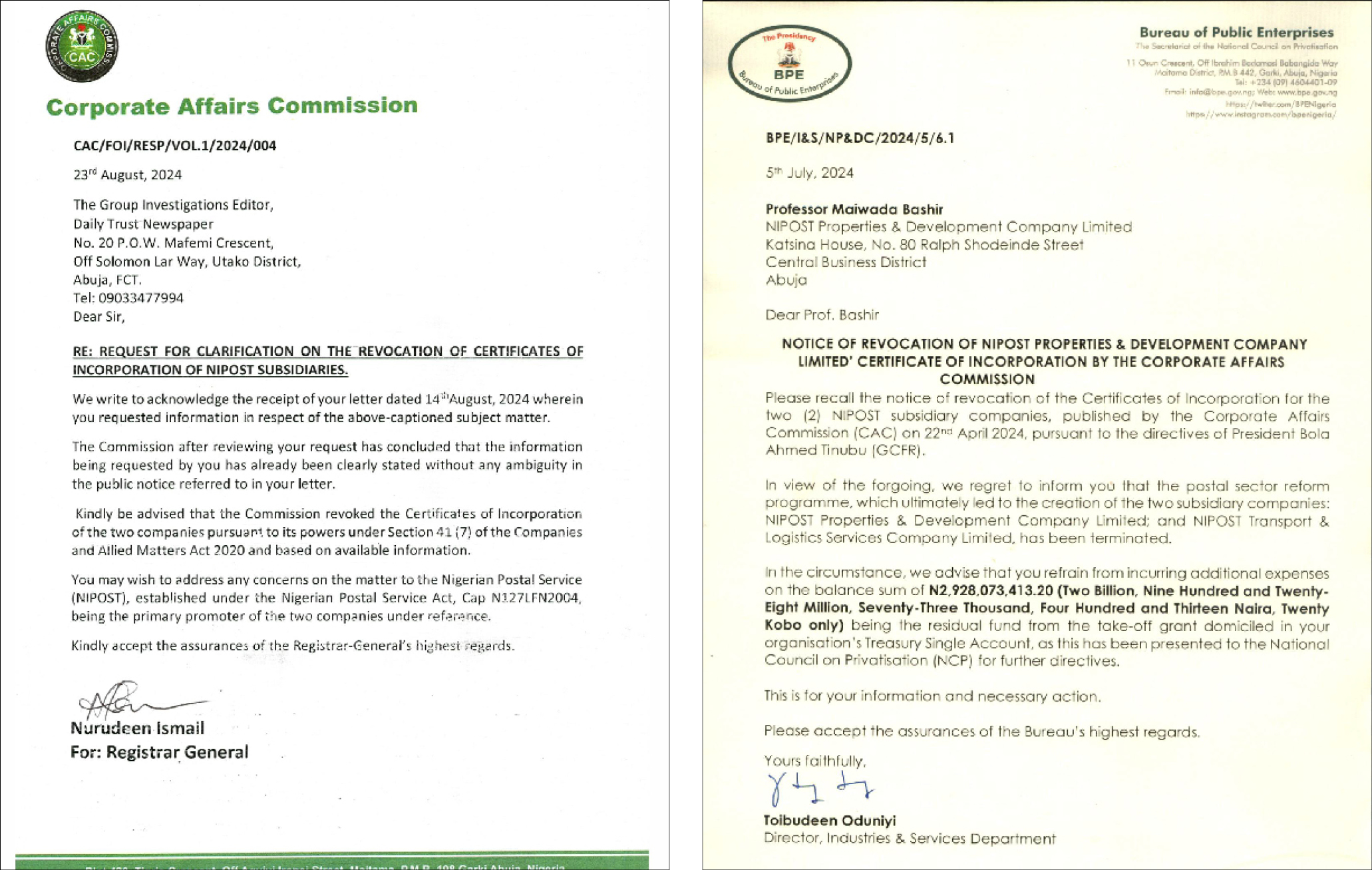There are growing concerns over President Bola Ahmed Tinubu’s termination of the postal reform initiative, which founded the two self-accounting non-postal subsidiaries to salvage the dwindling revenue problem of the Nigerian Postal Service (NIPOST).
Findings by the Daily Trust revealed that the initiative, which commenced in 2017 during the Buhari-led administration, was terminated by President Tinubu through a directive to the Corporate Affairs Commission (CAC).
The expansion was aimed at rejuvenating NIPOST from an underperforming agency by creating other self-accounting subsidiaries that will operate under the agency to increase its commercial viability.
Recall that the Ministry of Finance released N10 billion as a take-off grant for the initiative, which was captured in the 2022 budget. Since then, it has yet to yield any return due to the stalled process.
- MRA condemns harassment of citizens by DSS for exercising right to information
- Houseboy arrested for sodomizing master’s grandsons, 3 others
Recently, the House of Representatives’ Public Accounts Committee, headed by Bamidele Salami (PDP, Osun) has knocked the Bureau of Public Enterprises over the underutilization of the take-off grant.
He said, ”It is unbelievable that the N10 billion was spent to register the two companies, NIPOST Transport and Logistics Limited and NIPOST Property that took off in May 2023, only for them to fold up barely a year after through a presidential directive in May 2024.”
Documents sighted by this reporter indicated that the Ministry of Communication and Digital Economy, the Nigerian Council for Privatization (NCP), the Bureau of Public Enterprises (BPE) and former top management of NIPOST were all part of the reform process.
Confidential sources within NIPOST, an agency under the Federal Ministry of Communication and Digital Economy, who spoke to Daily Trust, added that the unbundling process was transparent; that controversies began when the new administration came on board.

“The BPE, NCP, Ministry of Communication, NIPOST, KPGM (advisory body) and Deloitte were all part of the process. Seven years of human and material resources have gone into this programme, and few people who have access to the president got it cancelled overnight, despite the resources invested in it,” a source hinted.
Speaking to Daily Trust, a policy analyst, Vincent Nwanma, stated that reforms are initiated to improve the performance of a system; “Anything beyond that can only be explained in terms of the politics of policy formulation.”
“Reforms are administration-specific, but this doesn’t mean subsequent administrations should do away with every reform. It is a question of the new administration reviewing what is on the ground and taking a justifiable decision,” he added.
A glance at the reform
The Senate passed the Nigeria Postal Services Bill on July 19, 2018, but is still awaiting presidential approval, according to information from the Bureau of Public Enterprises (BPE) portal. It also indicated that part of the bill’s prospects was the creation of the three subsidiaries, which are discussed further.
Before then, specifically in August 2017, under the Buhari-led administration, a steering committee was inaugurated and saddled with the responsibility of laying the foundation for the restructuring and modernisation of the Nigerian postal service.
The then minister of communication, Adebayo Shittu, said the ministry initiated the move to reposition the agency into an economically viable and internationally accepted one.
As of October 2017, the National Council for Privatisation (NCP) had approved the postal sector reform through the Bureau of Public Enterprises (BPE).
When Professor Isa Pantami took over as minister and brought forward the initiative in 2019, he proposed the unbundling of NIPOST from performing the dual roles of both operator and regulator.
Findings by Daily Trust revealed that, based on KPMG’s (a multinational advisory services network) recommendation, the companies were incorporated with the CAC in February 2020.
The three new subsidiaries created were NIPOST Properties and Development Company Limited (RC1673880), NIPOST Transport and Logistics Service Limited (RC1673881), and NIPOST Microfinance Bank Limited (RC1673882).
Investigations revealed that the NCP initially approved the release of N21,502,250,000 as a take-off grant to initiate the smooth commencement of the non-postal subsidiaries. However, documents sighted by this reporter revealed that the Ministry of Finance released only N10 billion.
N5.5 billion was paid to the transport and logistics subsidiary; N3.5 billion was given to the property and development company; NIPOST, the mother agency, received N600 million; and BPE received N400 million, but NIPOST Microfinance Bank did not receive its budgeted N11.52 billion because its operating license was still pending with the Central Bank of Nigeria.
The NIPOST subsidiaries’ shareholding and board structure, as indicated on the CAC status report on the shareholding structure, reveal that the Federal Government of Nigeria owns 100 per cent of the shares, with NIPOST holding 80 per cent, the Ministry of Finance Incorporated holding 10 per cent and BPE holding 10 per cent.
A peek into NIPOST’s performance
Checks by Daily Trust showed that the NIPOST revenue dashboard after 2016 has been experiencing a significant nosedive since 2018. Data from the National Bureau of Statistics (NBS) website indicates that the agency experienced a 44 per cent revenue fall from 2019 to 2022.
From 2019 to 2022, NIPOST received a total allocation of N43.6 billion, but the agency generated only N16.7 billion within that period. As of 2023, NIPOST had increased its personnel cost from N13 billion to N18 billion for 2024, despite its underperformance.
Against this backdrop, the Senate in November 2023 threatened to privatise NIPOST due to ‘its abysmal revenue generation and lack of functionality.’ The Postmaster General of the Federation, Omotola Adeyemi, received the warning during the agency’s 2024 proposal defense.
The Chairman of the Joint Committee on Finance, Sani Musa, while raising concern during the continuation of the 2024–2026 Medium-Term Expenditure Framework public hearing at the National Assembly in Abuja, gave the agency two years to revamp its services and change the business model to achieve self-sustenance.
Matters arising
A series of allegations had trailed the programme even before the termination. According to reports, the fund earmarked to restructure Nigeria’s postal service was reported missing, and the Senate ordered a probe into the allegation.
Also, the House Committee on Finance, Loans and Debt Management revealed that an investigation into the N10 billion for the restructuring of NIPOST would be launched as part of the House’s ongoing efforts to enhance transparency and accountability in the public sector.
To date, the findings of the investigation have not been made public. However, separate letters sent by the Bureau of Public Enterprises (BPE) to both subsidiaries referencing the revocation by the CAC indicated otherwise.
The letters, dated July 5, 2023, revealed that N5,152,619,294.77 from the N5.5 billion take-off fund for the transport and logistics company is domiciled in its Treasury Single Account (TSA) and “has been presented to the National Council for Privatisation for further directives.”
Continued on www.dailytrust.com
Out of the N3.5 billion given to the property and development company, N2,928,073,413.20 was also indicated to be domiciled in the company’s Treasury Single Account, and the remaining N1 billion was initially split between BPE and NIPOST.
The letter from BPE to both subsidiaries did not mention specific reasons for President Tinubu’s termination of the reform initiative after the subsidiaries commenced operations. However, Daily Trust reached out to the BPE, the driver of the reform and privatization programme of the federal government, for clarification on the programme termination since it was also part of the process.
On August 14, 2024, Daily Trust wrote to the office of the Director General, and the letter was received and acknowledged. To date, that letter has been met with silence. Amina Othman, the agency’s spokeswoman, was contacted before then.
She instructed this reporter to send an email detailing his request to the official email addresses she provided. Weeks later, she has failed to respond to the questions aimed at understanding the problem despite reminders.
On its part, the Corporate Affairs Commission (CAC) issued certificates of incorporation to the subsidiaries in 2020 and revoked them in April 2024, citing ‘improper procurement’ as the reason for the revocation.
However, Daily Trust wrote to the Registrar General, Nurudden Ismail, on the ‘improper procurement,’ even though relevant authorities like the Bureau of Public Enterprises (BPE) and the National Council for Privatization (NCP) were carried along.
In response, the registrar general said, “Kindly be advised that the commission revoked the certificates of incorporation of the two companies pursuant to its powers under Section 41(7) of the Companies and Allied Matters Act 2020 and based on available information.”
“You may wish to address any concerns on the matter to the Nigerian Postal Service (NIPOST), established under the Nigerian Postal Service Act, Cap N127LFN2004, being the primary promoter of the two companies under reference,” the letter stated.
Section 41(7) of the Companies and Allied Matters Act No. 3 of 2020 empowers the commission to revoke the certificates of incorporation of improperly procured companies.
However, the notice letter BPE wrote to the already-active non-postal subsidiaries indicated that the revocation of certificates by the CAC was solely ‘pursuant to the directive of President Bola Tinubu’ and that ‘directive’ called for the termination of the postal sector reform programme.
It has nothing to do with me – PMG
Sources within NIPOST initially hinted that the Post Master General, Tola Odeyemi, wrote a request letter to President Tinubu calling for the programme’s termination.
In an interview with Daily Trust, Odeyemi refuted the allegation, saying the postal reform is ongoing and the deregistration of the new subsidiaries had a history even before she joined the service. “It is not a me issue. It has dragged for about two years, even before I joined,” she said.
“The postal reform is ongoing; it is just the creation of new subsidiaries that was halted. We have to reform NIPOST because the postal service in Nigeria has had a steady decline, and what the reform would do is bring it back to the forefront of Nigerians—not just through the mail, logistics, and courier service—but through e-government service, which we will be kick-starting soon.
“In terms of the activities that happened, these are restricted communications from the president’s office, and I am not at liberty to discuss or divulge what comes from the president. However, the deregistration of the two subsidiaries had a history because last year, the House of Representatives and the Senate both called for their dissolution,” Odeyemi noted.
She revealed that NIPOST is working with the Ministry of Communication and Digital Economy and the Bureau of Public Enterprises to develop a holistic roadmap to guide the overall postal reform.
However, attempts to get reactions from the presidency over the termination of the postal reform did not yield results, as several calls to the Special Adviser to the President on Information and Strategy, Bayo Onanuga and Ajuri Ngelale, erstwhile spokesman to the President (before his exit), did not go through.

 Join Daily Trust WhatsApp Community For Quick Access To News and Happenings Around You.
Join Daily Trust WhatsApp Community For Quick Access To News and Happenings Around You.


